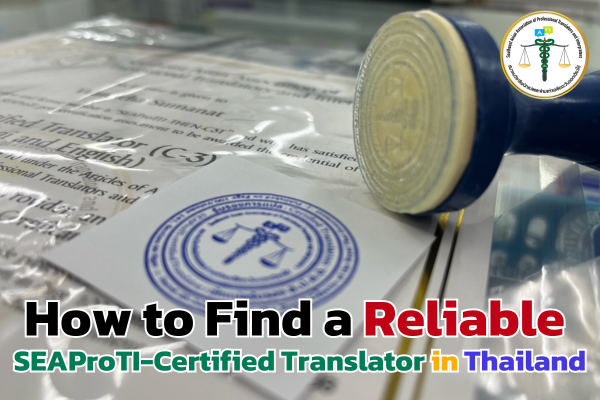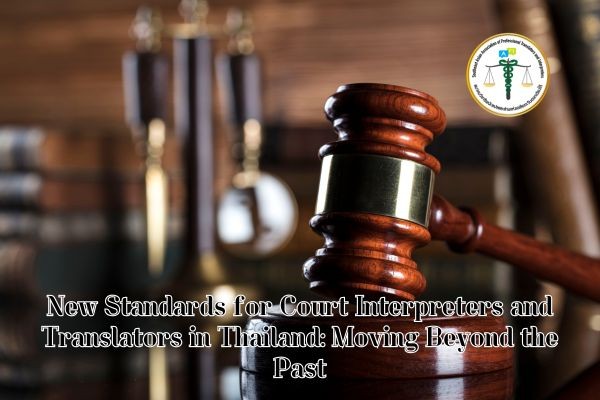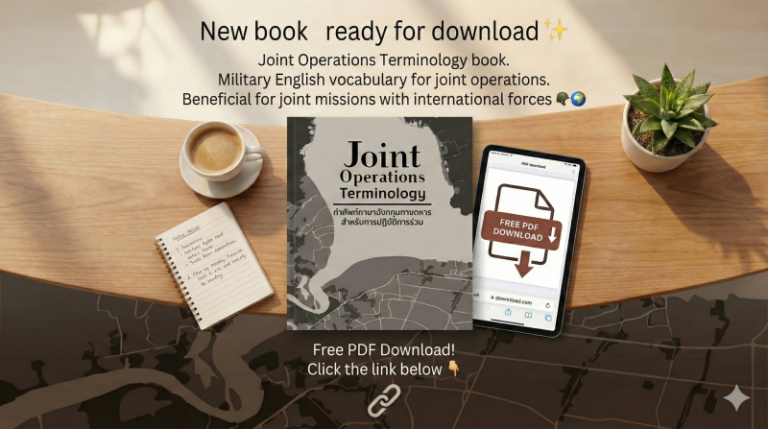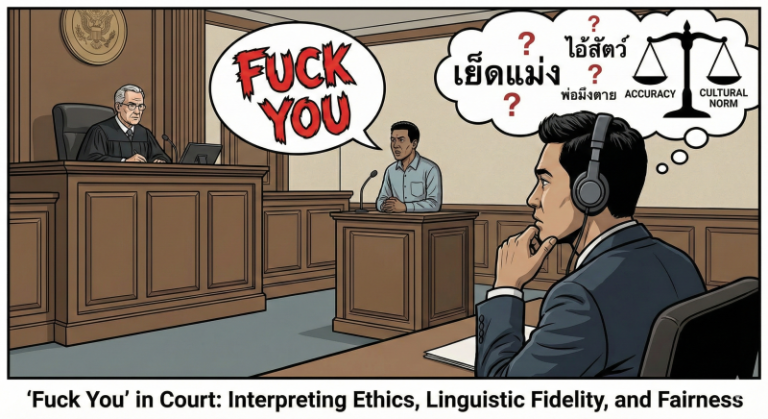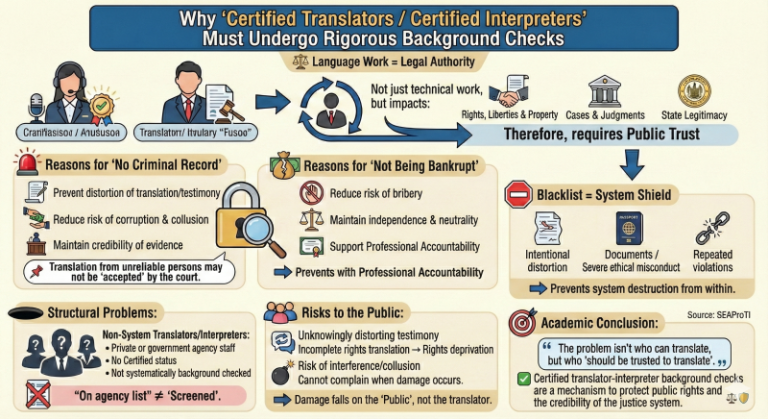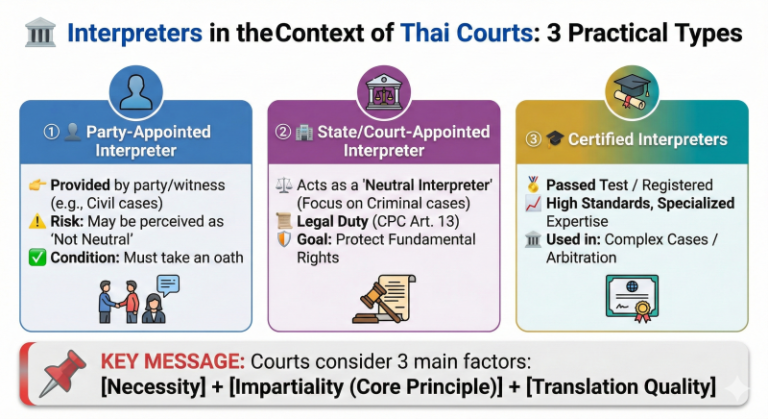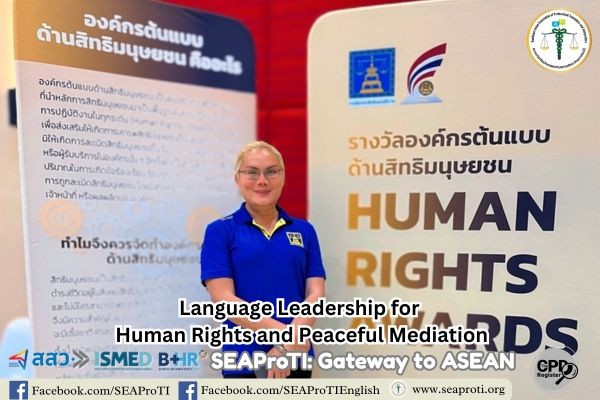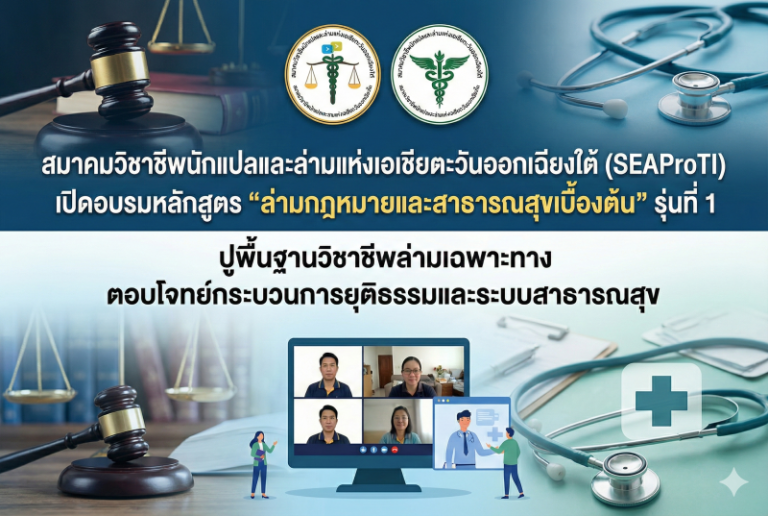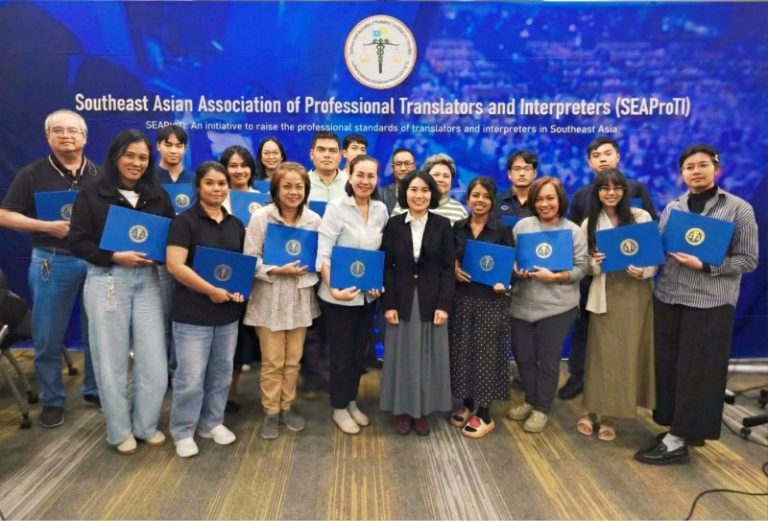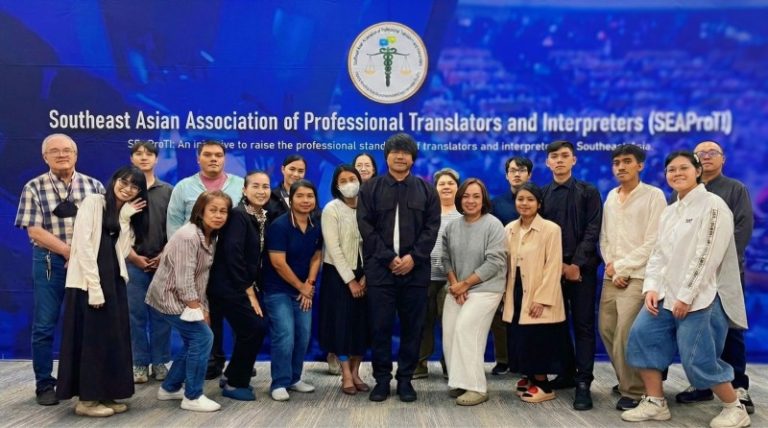Red Flags in Hiring Interpreters in Thailand: A Professional and Ethical Perspective
19 October 2025, Bangkok – This article examines key red flags and risk indicators when hiring interpreters in Thailand, based on professional standards, legal frameworks, and ethical expectations. The study highlights issues such as false credentials, ethical misconduct, and misuse of the title “court interpreter,” emphasizing the need for certified, accountable professionals under recognized associations like SEAProTI or CIOL.
Introduction
Interpreting is not merely a linguistic task; it is a profession that requires ethical integrity, legal awareness, and specialized training. In Thailand, the lack of statutory regulation and the prevalence of untrained interpreters have led to repeated cases of misrepresentation and professional misconduct. As a result, both legal institutions and private clients must develop awareness of potential red flags when hiring interpreters to prevent risks of miscommunication, confidentiality breaches, or procedural injustice.
A major red flag is the absence of formal certification from a recognized body such as the Southeast Asian Association of Professional Translators and Interpreters (SEAProTI), Chartered Institute of Linguists (CIOL), or National Accreditation Authority for Translators and Interpreters (NAATI). Certified interpreters are accountable under codes of ethics and disciplinary systems (SEAProTI, 2024). In contrast, uncertified interpreters operate without legal liability or peer oversight, which increases risks of professional negligence.
Some individuals promote themselves as “court interpreters” or “official interpreters” without any formal appointment. In Thailand, interpreters are appointed case-by-case by the presiding judge, not through a national registry. Misuse of the title “court-registered” interpreter misleads clients and violates ethical norms of honesty and transparency (Ministry of Justice, 2023).
Breach of Confidentiality and Impartiality
A professional interpreter is bound by confidentiality under Section 323 of the Thai Penal Code and professional ethics (SEAProTI Code of Conduct, 2024). Disclosing client information, showing documents, or discussing sensitive cases publicly constitutes a serious breach. Impartiality is also crucial — interpreters must not show emotional bias or act as advocates for either party (AIIC, 2023).
Lack of Bilingual and Domain Competence
Many so-called interpreters are bilingual speakers without formal interpreting training. Professional interpreters must master interpreting modes (consecutive, simultaneous, liaison) and possess specialized terminology, particularly in legal, medical, and diplomatic contexts (Pöchhacker, 2016). Lack of accuracy or over-reliance on paraphrasing can distort testimony and lead to judicial error.
Unrealistically Low Service Rates
Interpreting fees below industry standards often indicate inexperience or unethical competition. SEAProTI (2024) recommends fair compensation commensurate with the interpreter’s expertise, preparation time, and event complexity. Low-cost hiring may appear efficient but can result in poor quality and reputational damage to institutions.
Professional Misconduct and Poor Demeanor
Professional interpreters are expected to maintain neutrality, punctuality, and proper court or conference decorum. Behaviors such as casual chatting, interrupting proceedings, or dressing inappropriately demonstrate lack of professionalism and disrespect to judicial protocols (Thai Court of Justice, 2022).
Dependence on AI or Machine Translation Tools
While AI-assisted tools can support translation, their use in real-time interpreting constitutes a breach of confidentiality under Thailand’s Personal Data Protection Act (PDPA) Section 24. Sensitive data transmitted through online tools may expose private or legal information, violating ethical and data security standards (NCSA, 2024).
Lack of Continuous Professional Development (CPD)
Interpreters are required to maintain ongoing education in language, law, and ethics. SEAProTI (2024) mandates annual CPD renewal to ensure members stay updated with terminology and procedural changes. Absence of CPD participation suggests professional stagnation and outdated competence.
Absence of Written Contract or NDA
Interpreting services should always be bound by a written contract, covering scope of work, confidentiality, rates, and cancellation terms. Refusal to sign such documents signals non-professional conduct and exposes clients to financial and legal risk (CIOL, 2023).
Conclusion
Hiring interpreters in Thailand requires not only linguistic assessment but also verification of professional integrity, certification, and ethical compliance. The increasing demand for certified interpreters underscores the importance of institutional standards and transparent vetting systems. Recognizing red flags — from false credentials to ethical breaches — protects both clients and the justice system from misrepresentation and procedural harm.
References
Chartered Institute of Linguists (CIOL). (2023). Code of Professional Conduct. London: CIOL.
Ministry of Justice, Thailand. (2023). Court Interpreter Appointment Guidelines. Bangkok: Office of the Judiciary.
National Cyber Security Agency (NCSA). (2024). Data Protection Handbook: PDPA Compliance in Legal Services. Bangkok: NCSA Press.
Pöchhacker, F. (2016). Introducing Interpreting Studies (2nd ed.). Routledge.
SEAProTI. (2024). Professional Code of Conduct and Certification Guidelines. Bangkok: SEAProTI.
Thai Court of Justice. (2022). Manual for Court Interpreters. Bangkok: Administrative Office of the Judiciary.
The Southeast Asian Association of Professional Translators and Interpreters (SEAProTI) has formally announced the qualifications and requirements for registration of Certified Translators, Translation Certification Providers, and Certified Interpreters in Sections 9 and 10 of the Royal Gazette, published by the Secretariat of the Cabinet, Office of the Prime Minister of Thailand, on 25 July 2024 (Vol. 141, Part 66 Ng, p. 100). Certified Translators, Translation Certification Providers, and Certified Interpreters
The Council of State has proposed the enactment of a Royal Decree, granting registered translators and recognized translation certifiers from professional associations or accredited language institutions the authority to provide legally valid translation certification (Letter to SEAProTI dated April 28, 2025)
SEAProTI is the first professional association in Thailand and Southeast Asia to implement a comprehensive certification system for translators, certifiers, and interpreters.
Head Office: Baan Ratchakru Building, No. 33, Room 402, Soi Phahonyothin 5, Phahonyothin Road, Phaya Thai District, Bangkok 10400, Thailand
Email: hello@seaproti.com | Tel.: (+66) 2-114-3128 (Office hours: Mon–Fri, 09:00–17:00)
วิชาชีพล่ามไม่ได้เป็นเพียงการถ่ายทอดภาษา แต่เป็นกระบวนการทางวิชาชีพที่ต้องอาศัยความซื่อสัตย์ จรรยาบรรณ และความเข้าใจทางกฎหมายอย่างลึกซึ้ง ในประเทศไทย การขาดระบบกำกับดูแลที่ชัดเจน ทำให้มี “ล่ามทั่วไป” จำนวนมากที่ไม่มีการอบรมหรือการรับรอง จึงเกิดปัญหาการแอบอ้างและความผิดพลาดทางวิชาชีพ การตระหนักถึง “สัญญาณอันตราย” จึงเป็นสิ่งจำเป็นเพื่อหลีกเลี่ยงความเสียหายจากการแปลผิดหรือการละเมิดสิทธิในกระบวนการยุติธรรม
สัญญาณสำคัญประการแรกคือ การไม่มีใบรับรองจากองค์กรวิชาชีพ เช่น สมาคมนักแปลและล่ามแห่งเอเชียตะวันออกเฉียงใต้ (SEAProTI) Chartered Institute of Linguists (CIOL) หรือ National Accreditation Authority for Translators and Interpreters (NAATI) ล่ามที่ได้รับการรับรองเหล่านี้จะอยู่ภายใต้ระบบจรรยาบรรณและการตรวจสอบทางวินัย (SEAProTI, 2024) ขณะที่ล่ามที่ไม่มีใบรับรองไม่มีความรับผิดทางจรรยาบรรณ และไม่อยู่ในขอบเขตการกำกับขององค์กรวิชาชีพ
การแอบอ้างตำแหน่ง “ล่ามศาล”
บุคคลบางรายอ้างตนว่าเป็น “ล่ามศาล” หรือ “ล่ามประจำราชการ” ทั้งที่ไม่เคยได้รับการแต่งตั้งจริง ในประเทศไทย ล่ามจะได้รับการแต่งตั้ง “เป็นรายคดี” โดยศาลเท่านั้น การใช้คำว่า “ล่ามศาลที่ขึ้นทะเบียน” โดยไม่มีหลักฐานถือเป็นการหลอกลวงและขัดต่อจรรยาบรรณแห่งความซื่อสัตย์ (กระทรวงยุติธรรม, 2023)
การละเมิดความลับและความเป็นกลาง
ล่ามมืออาชีพต้องรักษาความลับตาม ประมวลกฎหมายอาญา มาตรา 323 และหลักจรรยาบรรณ (SEAProTI Code of Conduct, 2024) การเปิดเผยข้อมูลลูกค้าหรือคดี หรือการนำเอกสารมาแสดงต่อสาธารณะ ถือเป็นการละเมิดจรรยาบรรณขั้นร้ายแรง เช่นเดียวกับการแสดงอคติหรือเข้าข้างฝ่ายใดฝ่ายหนึ่ง (AIIC, 2023)
ขาดทักษะสองภาษาและความรู้เฉพาะสาขา
ล่ามจำนวนมากเป็นเพียงผู้ที่พูดได้สองภาษาโดยไม่มีการฝึกอบรมด้านการล่าม ล่ามมืออาชีพต้องเข้าใจรูปแบบการล่ามทั้ง การล่ามแบบต่อเนื่อง (consecutive), แบบพร้อมพูด (simultaneous) และ แบบล่ามตาม (liaison) รวมทั้งต้องมีคำศัพท์เฉพาะในด้านกฎหมาย การแพทย์ และการทูต (Pöchhacker, 2016) การแปลแบบตีความผิดหรือพึ่งพาเครื่องมือแปลอัตโนมัติอาจทำให้ข้อมูลทางคดีบิดเบือน
ค่าจ้างต่ำผิดปกติ
อัตราค่าล่ามที่ต่ำเกินไปมักสะท้อนถึงการขาดประสบการณ์หรือการทำงานแบบไม่เป็นมืออาชีพ SEAProTI (2024) แนะนำให้กำหนดค่าจ้างตามความชำนาญ ระยะเวลาเตรียมงาน และความซับซ้อนของงาน การว่าจ้างล่ามราคาถูกอาจดูคุ้มค่าในระยะสั้น แต่เสี่ยงต่อคุณภาพและชื่อเสียงขององค์กรในระยะยาว
พฤติกรรมไม่เหมาะสมในทางวิชาชีพ
ล่ามมืออาชีพต้องรักษากิริยา ความตรงต่อเวลา และการแต่งกายให้เหมาะสม โดยเฉพาะในศาลหรือการประชุมทางการ การพูดแทรก พูดคุยส่วนตัว หรือแต่งกายไม่สุภาพถือเป็นการละเมิดมารยาทในกระบวนการยุติธรรม (ศาลยุติธรรม, 2022)
แม้เทคโนโลยีแปลภาษาอัตโนมัติจะช่วยในงานเอกสาร แต่การใช้ในระหว่างการล่ามสดถือเป็นการละเมิดความลับตาม พระราชบัญญัติคุ้มครองข้อมูลส่วนบุคคล (PDPA) มาตรา 24 ข้อมูลที่ถูกประมวลผลผ่านระบบออนไลน์อาจรั่วไหลและกระทบต่อสิทธิส่วนบุคคล (NCSA, 2024)
ไม่มีการพัฒนาวิชาชีพต่อเนื่อง (CPD)
ล่ามที่ไม่มีการอบรมหรือเข้าร่วมกิจกรรมพัฒนาวิชาชีพประจำปี ถือเป็นสัญญาณของการขาดการพัฒนา SEAProTI (2024) กำหนดให้สมาชิกต้องต่ออายุและรายงาน CPD รายปี เพื่อให้ความรู้ด้านภาษาและกฎหมายทันสมัยอยู่เสมอ
งานล่ามควรมีการทำ สัญญาจ้างหรือหนังสือรักษาความลับ (NDA) ระบุขอบเขตงาน อัตราค่าจ้าง และเงื่อนไขการยกเลิก หากล่ามปฏิเสธการลงนามเอกสารดังกล่าว ถือเป็นสัญญาณของความไม่เป็นมืออาชีพ (CIOL, 2023)
สรุป
การจ้างล่ามในประเทศไทยจำเป็นต้องพิจารณาทั้งด้านทักษะภาษา คุณธรรม จรรยาบรรณ และการรับรองจากองค์กรวิชาชีพ การตระหนักถึงสัญญาณอันตรายต่าง ๆ จะช่วยป้องกันความเสียหายจากการแปลผิด ความลับรั่วไหล หรือการละเมิดสิทธิทางกระบวนการยุติธรรม และส่งเสริมให้เกิดมาตรฐานล่ามที่เป็นมืออาชีพอย่างแท้จริง
เอกสารอ้างอิง
- AIIC. (2023). AIIC Code of Professional Ethics. International Association of Conference Interpreters.
- Chartered Institute of Linguists (CIOL). (2023). Code of Professional Conduct. London: CIOL.
- กระทรวงยุติธรรม. (2566). แนวทางการแต่งตั้งล่ามศาล. กรุงเทพฯ: สำนักงานศาลยุติธรรม.
- สำนักงานคณะกรรมการความมั่นคงปลอดภัยไซเบอร์แห่งชาติ (NCSA). (2567). คู่มือ PDPA สำหรับงานบริการทางกฎหมาย. กรุงเทพฯ: เอ็นซีเอสเอเพรส.
- Pöchhacker, F. (2016). Introducing Interpreting Studies (2nd ed.). Routledge.
- SEAProTI. (2024). จรรยาบรรณและแนวปฏิบัติวิชาชีพนักแปลและล่าม. กรุงเทพฯ: SEAProTI.
- ศาลยุติธรรม. (2565). คู่มือการปฏิบัติงานล่ามศาล. กรุงเทพฯ: สำนักงานศาลยุติธรรม.
สมาคมวิชาชีพนักแปลและล่ามแห่งเอเชียตะวันออกเฉียงใต้ (SEAProTI) ได้ประกาศหลักเกณฑ์และคุณสมบัติผู้ที่ขึ้นทะเบียนเป็น “นักแปลรับรอง (Certified Translators) และผู้รับรองการแปล (Translation Certification Providers) และล่ามรับรอง (Certified Interpreters)” ของสมาคม หมวดที่ 9 และหมวดที่ 10 ในราชกิจจานุเบกษา ของสำนักเลขาธิการคณะรัฐมนตรี ในสำนักนายกรัฐมนตรี แห่งราชอาณาจักรไทย ลงวันที่ 25 ก.ค. 2567 เล่มที่ 141 ตอนที่ 66 ง หน้า 100 อ่านฉบับเต็มได้ที่: นักแปลรับรอง ผู้รับรองการแปล และล่ามรับรอง
สำนักคณะกรรมการกฤษฎีกาเสนอให้ตราเป็นพระราชกฤษฎีกา โดยกำหนดให้นักแปลที่ขึ้นทะเบียน รวมถึงผู้รับรองการแปลจากสมาคมวิชาชีพหรือสถาบันสอนภาษาที่มีการอบรมและขึ้นทะเบียน สามารถรับรองคำแปลได้ (จดหมายถึงสมาคม SEAProTI ลงวันที่ 28 เม.ย. 2568)
สมาคมวิชาชีพนักแปลและล่ามแห่งเอเชียตะวันออกเฉียงใต้ เป็นสมาคมวิชาชีพแห่งแรกในประเทศไทยและภูมิภาคเอเชียตะวันออกเฉียงใต้ที่มีระบบรับรองนักแปลรับรอง ผู้รับรองการแปล และล่ามรับรอง
สำนักงานใหญ่: อาคารบ้านราชครู เลขที่ 33 ห้อง 402 ซอยพหลโยธิน 5 ถนนพหลโยธิน แขวงพญาไท เขตพญาไท กรุงเทพมหานคร 10400 ประเทศไทย
อีเมล: hello@seaproti.com โทรศัพท์: (+66) 2-114-3128 (เวลาทำการ: วันจันทร์–วันศุกร์ เวลา 09.00–17.00 น.)



